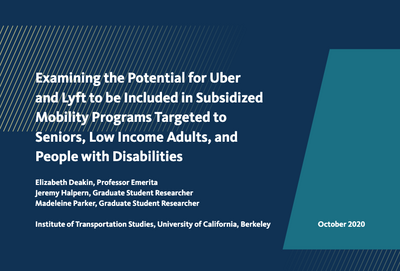October 21, 2020
 UC Berkeley City and Regional Planning Professor Emerita Elizabeth Deakin and Graduate Student Researchers Jeremy Halpern and Madeleine Parker recently published Examining the Potential for Uber and Lyft to be Included in Subsidized Mobility Programs Targeted to Seniors, Low Income Adults, and People with Disabilities.
UC Berkeley City and Regional Planning Professor Emerita Elizabeth Deakin and Graduate Student Researchers Jeremy Halpern and Madeleine Parker recently published Examining the Potential for Uber and Lyft to be Included in Subsidized Mobility Programs Targeted to Seniors, Low Income Adults, and People with Disabilities.Abstract: Public agencies have subsidized taxi rides for people who have difficulty driving a car or using the regular transit system – targeting older residents and people with disabilities. There is interest among public agencies to add transportation network companies (TNCs), such as Uber and Lyft, to subsidized ride programs as a travel option due to the widespread availability of TNCs and high-quality service. Key issues include the need for wheelchair accessible vehicles, subsidy needs, and clients who lack or are uncomfortable using a smartphone and credit card. This research included a review of programs nationwide and interviews with program managers and clients to identify best practices. Best practices from agencies included contracting for wheelchair accessible TNC services, offering classes to help clients learn how to use the needed technologies, arranging for prepaid debit cards, creating a centralized billing system, providing a concierge service for those who need extra assistance, and setting subsidies based on need. Other recommended practices include providing high travel needs coverage, developing straightforward pricing structures, and not imposing restrictions on trip distance or trip purposes eligible for subsidy.